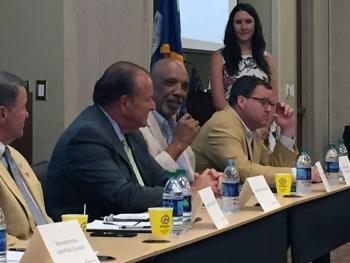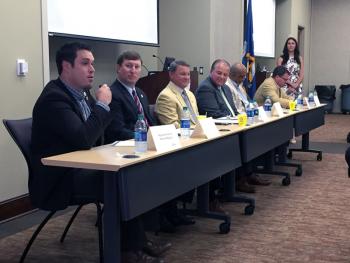
Speaker Taylor Barras, Rep. Terry Landry and Rep. Stuart Bishop (seated L-R) take part in a panel organized by One Acadiana.

Vermilion Parish Rep. Blake Miguez (seated left), Rep. Jean-Paul Coussan and Sen. Paige Cortez took part in the One Acadiana panel.
Local legislators discuss possible increase of gasoline tax, other issues with One Acadian
Driving the roads in Louisiana leaves a little bit to be desired.
The issue facing the state in making improvements in that regard is a $12.7 billion hole for road and bridge repairs and maintenance.
An avenue for those who desire better roads, as well as bridges, in the state is an increase in the state’s gasoline tax.
“There’s no question about it,” State Rep. Stuart Bishop said Tuesday during a panel organized by One Acadiana. “The last time we increased the fuel tax was in 1986. That is when cars got, maybe, 10 miles per gallon. Now there are cars getting 40 miles per gallon.”
Legislators from around Acadiana discussed that, among other issues facing the state, Tuesday during a panel conducted by One Acadiana, the economic development agency that represents the area’s nine parishes.
Members of the One Acadiana, representing various industries, heard from local legislators. The panel included Speaker of the House of Representatives Taylor Barras, Rep. Stuart Bishop, Rep. Jean-Paul Coussan, Rep. Nancy Landry, Rep. Terry Landry, Rep. Blake Miguez and Sen. Paige Cortez. The event took place at the Cecil Picard Center in Lafayette.
Rep. Terry Landry, who represents portions of Iberia, Lafayette and St. Martin Parishes, is a member of the state task force charged with looking for transportation funding solutions. He said an increase in the gasoline tax is viable, but a message must be made clear if that is to come to fruition.
“One thing I have learned in the last five years about transportation is trust” Landry said, “People are willing to pay a fair share of gasoline tax, with the guarantee that the money goes where it is intended. It has to go towards our infrastructure. It can’t go for administrative cost. It can’t go to fill the general fund’s obligations.
“It has to go towards the transportation trust fund.”
Bishop said that is the only way the increase can happen.
“The public has to absolutely know that the money is going to be strictly dedicated to roads and bridges. We have to make sure as a community, and as legislators, that we let everyone know that it does not go to the general fund.
“It is protected and goes to roads and bridges.”
In some way, shape or form, something has to be done to project the future of roads and bridges, Bishop stressed.
“It is something we have to address because the roads in Louisiana, and we all see, are terrible,” Bishop said. “If you go on vacation in Texas, its wonderful. You go the other way (east), its good. When you get to Louisiana, it’s not so pretty. Do we need to open up and look at tolls? Do you need to look at other options? Absolutely. If it does come down increasing the fuel tax, then let’s put it on the ballot and let the public decide.”
“At some point, we don’t want to see Louisiana on gravel roads. We have to make a change.”
The Legislature spent a record 19 weeks attempting to change the state’s financial fate. Speaker Barras, of New Iberia, told One Acadiana he feels an effect happened in that regard.
“We set out basically looking for $3 billion out of a $10 billion budget,” Barras said. “We started in February looking for $900 million to finish the June 30 fiscal year. We came within $70 million of closing that. At the end of the second special session, we finished $300 million short.”
Barras said that is much better than the number would appear.
“When you are $300 million short on a $10 billion budget,” he said, “my basic arithmetic says that’s three percent off what every department would have requested as part of their budget.
“In a time like this, if the 20 state agencies can’t live without three percent of their budget over a 12-month period, we have a bigger problem than we think.”
Barras thanked One Acadiana members for their support in the process.
“Thank you for all of your supportive comments,” Barras said. “The business community, One Acadiana, is greatly represented in Baton Rouge.
“Our business community’s voice is heard.”
Barras said that will remain the case as the Legislature faces the challenges of 2017 and beyond.
“The challenge will be that most of the revenue raisers we passed this year will sunset at the end of 2018,” Barras said. “The session will begin in April (‘17). It is a fiscal session, so that is our opportunity if we are going to do any type of comprehensive tax reform, that it be tackled during that fiscal session.
“Otherwise, in the spring of ‘18, we are going to have to do what we just did, call special sessions, because we can’t do revenue raisers during regular session.”
As Barras thanked the group earlier, One Acadiana CEO Jason El Koubi returned the gesture to each of the legislatures attending Tuesday.
“These guys have been through a tough three sessions,” El Koubi said. “It was 19 weeks away from their businesses and families.”
- Log in to post comments
